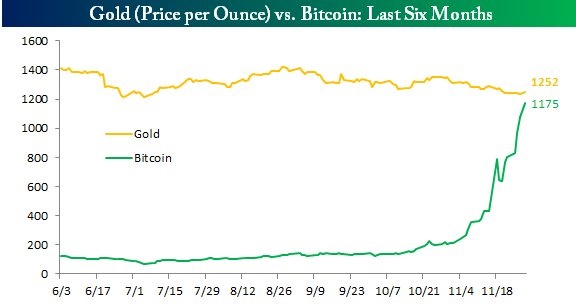In some corners of the Internet - where topics such as the collapse of the global monetary system or runaway inflation are the stuff of common, and lively, conversation — one question in particular elicits particularly heightened emotions: is bitcoin as good as gold? Since the fall of the Bretton Woods monetary regime in 1971 and the double-digit inflation that followed, investors have considered gold a hedge against inflation and a check against central banks who have the capacity to resort to money printing and currency devaluation as a means of decreasing the burden of public debt and encouraging export growth. But while gold often thrives in inflationary environments, it’s really a bet against something far worse than inflation. After all, run-of-the-mill stocks, real estate, or even inflation-protected government bonds can protect you against against a decline in the real value of government-issued currencies. But for many investors all over the world, gold is a great protector against much more severe events than 1970s-style inflation, like war or prolonged depression. MORE: The real reason Bitcoin is doomed Now that bitcoin has grown closer to the mainstream, though, and offers many of the same qualities that gold does — like scarcity and freedom from the influence of government — which is better at protecting investors against the very worst? As a store of value: The total number of bitcoins that can be mined has been preset at 21 million, whereas the amount of gold that can be mined is a more complicated question. Over time, the increase in the supply of gold has increased at roughly 1-3% per year, but on a short-term basis there can conceivably be a lot of volatility in the price of gold due to new discoveries. Of course, as a new technology, bitcoin is subject to much more volatility than gold. But over the long run, given the fact that no new bitcoins will be mined after the 21-millionth, we can expect it to ultimately serve as a better store of value than gold. Advantage: bitcoin Confiscatory risk: In the event of widespread social upheaval or depression, the risk that governments will confiscate private assets is quite real. In fact, in 1933 and 1934 the United States government made it illegal to privately own gold and confiscated it, first by executive order, then by Congressional decree. Gold holders were compensated for their assets, but the whole point of the exercise was to to devalue the dollar in gold terms, so those reimbursed weren’t receiving the real market value for their assets. If something like this were to happen again, would you be safer holding gold or bitcoin? In one sense, it doesn’t really matter. If the government wanted to take your gold or your bitcoins, and you resisted, you’d be a lawbreaker in any case. But if you’re determined to thwart the government, it’s probably a bit easier to do it with gold than with bitcoin. Sure, there are ways to buy bitcoin so that your identity is not traceable via the bitcoin blockchain, but it’s more complicated than buying small amounts of gold with cash at a coin show and not reporting it to the government. Disclaimer: obviously, breaking the law is breaking the law and that’s not advisable, even in some of these worst-case, hypothetical scenarios. Advantage: gold MORE: Bitcoin ‘vault’ company raises $20 million from big-name investors Hedge against the absolute worst: If the prospect of World War III is keeping you up at night, it’s difficult to imagine bitcoin as a better bet than than gold. After all, bitcoin relies on the Internet to be functional, and if you are somehow severed from the power grid or the online community, your bitcoins will be worthless, even if you store them in physical form. Advantage: gold Ease of Use: Bitcoin is likely more useful in less dire situations, like if you’re a citizen of a country with a repressive or irresponsible government but you still have regular access to the Internet. Bitcoin has surged in popularity in places like Argentina, for instance, precisely because the currency there has been mismanaged and the Argentine economy suffers from chronic inflation. In a situation such as this, bitcoin is a better alternative than gold because owning real, physical gold is expensive to store and transport, while spending and storing bitcoin is effectively costless. Advantage: bitcoin As you can see, it’s difficult to declare a clear winner in this hard-money rumble. Much of gold and bitcoin’s value is speculative, based on investors’ predictions about how political events are likely to unfold. And politics is even harder to predict than profits, which is why so many mainstream economists and financial advisors recommend that you keep only a very small portion of your wealth in alternative investments like gold and bitcoin. This, of course, isn’t to say that gold and bitcoin are worthless; just that their worth is highly unpredictable. Gold, for instance, could soar in value if there is a successful political movement to restore its place in the global monetary system. This isn’t an entirely crazy notion, as the dollar-denominated world of floating exchange rates has led to instability in emerging markets and imbalances in global trade. And the same goes for bitcoin. If it can become widespread enough such that governments accept it and even incorporate it into their legal frameworks, the $600 or so that bitcoin is going for now might seem cheap.




